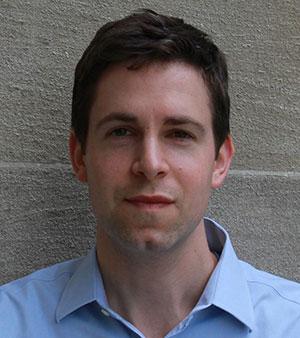New Course on Government Secrecy Debuts at Columbia Law School
Associate Professor David Pozen Brings Recent State Department Experience to the Classroom
Media Contact: Public Affairs, 212-854-2650 or [email protected]
New York, Oct. 12, 2012— As groups like WikiLeaks and Anonymous continue to make headlines for their disclosure of classified documents, one of Columbia Law School’s newest professors is offering students a peek behind the laws that facilitate and constrain government secrecy.
The secrecy course is taught by Associate Professor of Law David Pozen, who has been quickly making a name for himself as an expert in areas such as freedom of information and constitutional theory.
| Associate Professor of Law David Pozen |
Pozen joined the Law School faculty in July after serving as special adviser to the legal adviser of the U.S. Department of State, where his portfolio ranged from foreign official immunity and war powers issues to immigration.In that position, Pozen witnessed some of the fallout from WikiLeaks, and his new research will explore whether and to what extent such leaks are challenging the old regulatory paradigm.
In 2007 and 2008, Pozen served as a special assistant to Sen. Edward M. Kennedy. He was the lead Senate staffer working on the State Secrets Protection Act, which would have clarified the role of federal judges in deciding when and how the government can rely on the state secrets privilege in litigation. The state secrets privilege allows the government to keep out of court information that would harm national security. Critics claim the executive branch has used it excessively to shield certain practices from unwanted scrutiny.
In Pozen’s new Law of Government Secrecy seminar, students are studying the constitutional arguments for and against different types of official secrecy, the laws that organize secret-keeping and disclosure in the executive branch, and the judicial doctrines that govern secrecy in litigation. In addition to government reports and law review articles, course readings include some of the landmark cases in the field. One such case is Mohamed v. Jeppesen Dataplan, Inc., in which a panel of federal judges affirmed the dismissal of a lawsuit challenging the Central Intelligence Agency’s extraordinary rendition program. Under the controversial program, suspected terrorists were transferred secretly to countries without prohibitions on torture for interrogation.
Pozen also plans to set up discussions at the Law School with real-world practitioners, such as a former special assistant to the president, and is helping organize a public event in December that will feature prominent journalists who cover the national security beat.
He said he hopes students in his class will be inspired to “think critically about the claims made by executive branch secret-keepers and open-government advocates alike.”
“One of Columbia Law School’s best assets is a faculty with experience inside government, and Pozen adds even more strength and new dimensions there,” said Professor Matthew C. Waxman, the faculty co-chair of the Roger Hertog Program on Law and National Security. “Besides its obvious relevance to current hot-button national security issues, the secrecy course goes to our constitutional foundations, including the role of an informed electorate and a free press.”
In his current research, Pozen has turned his attention to government leaks. Despite recent high-profile examples—including the prosecution of Pfc. Bradley Manning, who is accused of leaking classified documents to WikiLeaks—fewer than a dozen prosecutions have been brought against leakers to the press since 1917, when the Espionage Act was passed. Meanwhile, newspapers regularly publish information from unnamed government sources. Pozen is drafting an article that seeks to shed light on the government’s relative tolerance of leaks by providing a new account of why there is so little criminal enforcement in this area and of the informal disciplinary mechanisms that have developed in place of such enforcement.
“Leaking has long been the subject of popular and scholarly fascination, and yet our understanding of the phenomenon is poor,” Pozen said, adding that much of the legal literature focuses on First Amendment questions without delving into broader, structural or functional issues. “I hope to advance our understanding of how classified information leaks are regulated within government, and to connect some of these insights to larger debates over executive power.”
Later this semester, Pozen will present his paper to the faculty at Duke University School of Law. He is also sharing his expertise with students beyond Columbia Law School, speaking about national security and leaks at several other universities, including Fordham, Harvard, and Princeton.
In addition to national security and constitutional law, Pozen’s areas of expertise include international and foreign affairs law and nonprofit organizations.
Pozen earned his law degree from Yale Law School in 2007. Before he joined the State Department in 2010, he clerked for U.S. Supreme Court Justice John Paul Stevens and for Judge Merrick B. Garland of the U.S. Court of Appeals for the D.C. Circuit.
“It is a great honor to join the Columbia Law School faculty, and I am thrilled to be here,” Pozen said. “I am particularly excited to join such a dynamic and diverse public law group.”
# # #
Columbia Law School, founded in 1858, stands at the forefront of legal education and of the law in a global society. Columbia Law School combines traditional strengths in corporate law and financial regulation, international and comparative law, property, contracts, constitutional law, and administrative law with pioneering work in intellectual property, digital technology, tax law and policy, national security, sexuality and gender, and environmental law.
